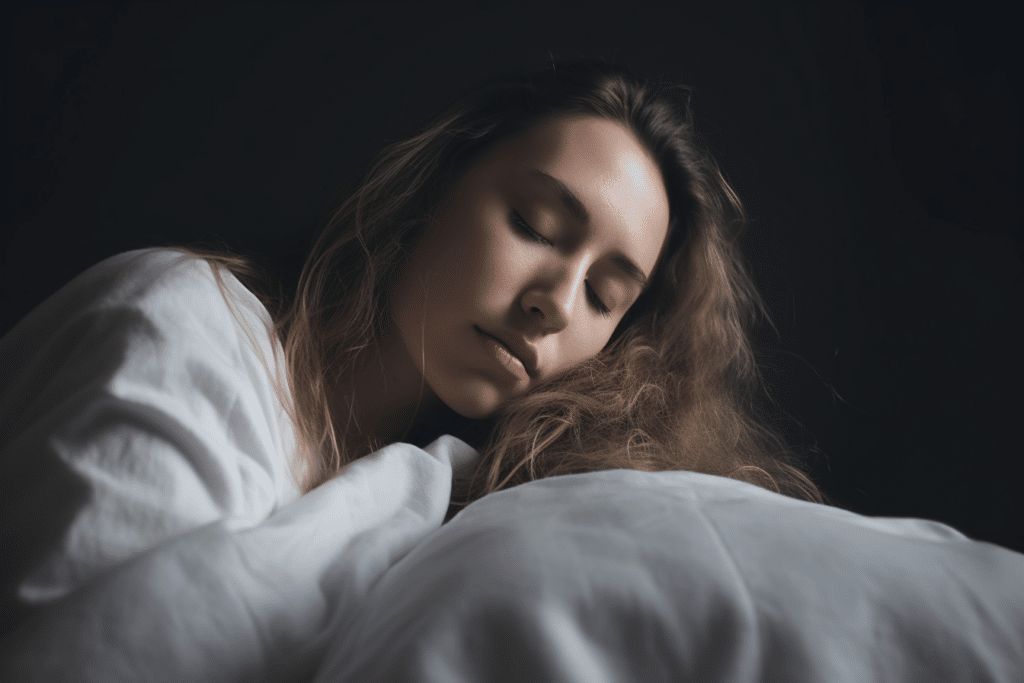Last Updated on August 2, 2023
In today’s world, smartphones have become an essential part of our daily lives, enabling us to stay connected and informed. Despite the numerous benefits smartphones offer, using them late at night can lead to negative side effects on our health and well-being. An increasing amount of research highlights the adverse effects linked to late-night smartphone usage, particularly pertaining to sleep quality and overall health.
One significant concern regarding late-night smartphone use is the exposure to blue light emitted by the devices, which can interfere with our circadian rhythm and the production of the sleep hormone melatonin. This disruption can result in difficulty falling asleep, poorer sleep quality, and even increased health risks in the long term. Moreover, children and young adults who frequently use smartphones before bedtime may experience heightened negative effects, given their developing brains and critical need for quality sleep.
Key Takeaways
- Late-night smartphone usage can negatively affect sleep quality and overall health.
- Blue light exposure from smartphones can disrupt the circadian rhythm and melatonin production.
- Children and young adults are particularly vulnerable to the adverse effects of late-night smartphone use.
Health Implications
Sleep Deprivation
Using phone devices at night may lead to sleep deprivation. One study revealed that smartphone usage with the Night Shift feature enabled could impact sleep outcomes in emerging adults 1. Moreover, it has been shown that using electronic media at night could be associated with sleep disturbances and poorer sleep quality in adolescents 2. Therefore, it seems essential for individuals to be cautious when using their phones before bedtime to ensure a good night’s sleep.
Mental Health Issues
The relationship between phone usage at night and various mental health issues has also been studied. Research indicates that problematic mobile phone use, bedtime procrastination, sleep quality, and depressive symptoms are interconnected among Chinese college students 3. This suggests that addressing phone usage at night may help improve mental health and prevent the development of depressive symptoms in young adults.
Heart Disease
Excessive phone usage at night may even have more severe health implications, such as heart disease. One study ]2 found that adolescents who engaged more in electronic media use at night, which also includes smartphones, showed negative effects related to heart health. While the research on the direct link between phone usage at night and heart disease is still limited, it is crucial for individuals to be aware of the potential risks and maintain a balance between smartphone use and maintaining overall health.
Blue Light Exposure
Effect on Melatonin Production
Blue light emitted from smartphones can have a significant effect on melatonin production in our bodies. Melatonin is a hormone responsible for regulating our sleep-wake cycle1. When exposed to blue light at night, melatonin production can be suppressed, leading to difficulty falling asleep and potential sleep disorders3. It is important to be aware of the impact of blue light exposure and consider reducing screen time before bed.
Circadian Rhythm Disruption
Circadian rhythm is our body’s internal process for regulating the sleep-wake cycle. Exposure to blue light from smartphones at nighttime can disrupt this natural process4. When our circadian rhythm is disrupted, it can lead to various problems, such as decreased alertness, fatigue, and even mood disorders2. To minimise this disruption, consider using blue light blocking features on your device or reducing screen time in the evening hours.
Impact on Sleep Quality
The usage of smartphones at night has been associated with a negative impact on sleep quality. The blue light emitted from these devices can delay the onset of sleep and reduce the amount of deep sleep we experience during the night5. This can lead to fatigue, poor concentration, and decreased cognitive performance the following day6. To improve sleep quality, it is recommended to limit exposure to blue light from smartphones before bedtime and create a sleep-friendly environment.
Impact on Children and Young Adults
Sleep and Social Media Usage
Research has shown that there is a link between smartphone use at night and disrupted sleep patterns in children and young adults. One study suggests that light from mobile phones has an impact on sleep-onset, making it difficult for users to fall asleep when exposed to the blue light emitted by smartphones. Furthermore, using smartphones at bedtime can delay sleep onset and negatively affect the quality of sleep in school-aged children and adolescents.
Mobile Phones and Attention
Another aspect of mobile phone use at night that can negatively impact children and young adults is its effect on attention. Excessive smartphone usage can have consequences for cognitive functions, including memory, learning, and concentration. A review of research on mobile phone use and mental health highlights the potential negative effects on attention, particularly when used at night or near bedtime.
Mood and Anxiety
The relationship between smartphone usage and mental health in young individuals is complex. Overusing mobile phones and social media can contribute to increased anxiety, stress, and mood fluctuations in children and young adults. A cohort study on smartphone use and addiction during the COVID-19 pandemic found that detrimental effects on mental health were more pronounced in cases of smartphone overuse.
To summarise, using smartphones at night can negatively impact the sleep quality, attention, and mental health of children and young adults. It is important for parents, educators, and healthcare professionals to be aware of these potential consequences and promote healthy digital habits within their respective communities.
Smartphone Use Patterns
Night-time Usage
The increasing availability of smartphones plays a significant role in shaping the behaviour of users, especially during the night. Studies have shown that the majority of students tend to use their mobile phones at night and evening. Night-time usage of smartphones often involves engaging with various apps, checking social media, and consuming online content. Prolonged exposure to screens, particularly before bedtime, can cause adverse effects on sleep quality and overall psychological health.
Sleep Environment
Creating a proper sleep environment is crucial for a good night’s rest. However, the presence of smartphones in the bedroom can disrupt the ideal sleep environment. Research has found that adolescents’ bedtime mobile phone use can lead to sleep disturbances and depressive symptoms. The light emitted from phone screens can affect the body’s production of melatonin, a hormone that regulates sleep. Additionally, engaging with the content available on smartphones before bed can impact the ability to relax and fall asleep.
Bedtime Habits
It is essential to establish healthy bedtime habits to ensure quality sleep and maintain psychological wellbeing. Incorporating smartphones into bedtime routines can form detrimental habits that negatively affect sleep patterns. Instead of using phones just before bed, consider implementing alternative relaxation techniques such as:
- Reading a physical book
- Practising mindfulness or meditation
- Drinking a cup of non-caffeinated herbal tea
- Ensuring the bedroom is peaceful and dark to aid sleep
By developing better bedtime habits, individuals can mitigate the negative effects associated with nighttime smartphone usage and improve their overall sleep quality and mental health.
Potential Solutions
Establishing a Sleep Routine
Developing a consistent sleep routine can help mitigate the negative effects of late-night smartphone usage. According to sleep medicine, it is essential to establish a regular bedtime and wake-up time, even on weekends. A consistent sleep schedule assists the body’s internal clock, making it easier to fall asleep and wake up refreshed in the morning. Besides, incorporating a relaxing bedtime routine, such as reading a book or taking a warm bath, can signal the body that it’s time to unwind and sleep.
Screen-free Zones
Creating screen-free zones in the home, particularly in the bedroom, is another effective strategy to reduce late-night smartphone use. By designating certain areas as screen-free zones, individuals can separate their sleep environment from the distractions of technology. This separation encourages the brain to associate the bedroom with relaxation and sleep, rather than cognitive engagement and stimulation.
Night Mode and Lighting Adjustments
Adjusting the settings on smartphones to minimise the impact of late-night usage is another viable solution. Many devices offer a night mode setting that reduces the emission of blue light, which interferes with the production of the sleep hormone melatonin. Dimming the screen brightness and using night mode can help lessen the negative impact of the device on sleep quality while still allowing for occasional use.
Alternative Alarm Clocks
One of the reasons people use their smartphones late at night is the reliance on them as alarm clocks. However, this function can be replaced with a traditional alarm clock or alternative alarms, such as sunrise lamps that mimic the rising sun to wake you up gently. By removing the smartphone from the bedside table, individuals decrease the temptation to use it before sleep, ultimately leading to better sleep hygiene.
Additional Considerations
Night Shift Workers
The impact of late-night smartphone usage is especially relevant for night shift workers1. These individuals often rely on electronic devices to stay connected during their extended work hours. However, studies have shown that excessive use of smartphones late at night can have detrimental effects on sleep quality and overall health3. In order to mitigate the negative consequences of using phones at night, shift workers should:
- Limit phone usage during work breaks
- Incorporate screen-free relaxation techniques
- Utilise blue light filtering apps or tools
Pandemic and Remote Work
The COVID-19 pandemic has led to an increase in remote work, causing many individuals to rely more on electronic devices for both professional and personal purposes4. This increased dependence on technology comes with its own set of challenges, as it can lead to longer screen time and blurred boundaries between work and personal life. Remote workers should consider the following tips to minimise potential negative effects:
- Set clear boundaries between work and leisure activities
- Dedicate specific spaces at home to separate work and relaxation
- Schedule regular technology-free breaks
Phone Addiction
Phone addiction is another crucial factor contributing to the adverse effects of using phones late at night2. This phenomenon can result in individuals feeling compelled to check their devices constantly, leading to disrupted sleep patterns and difficulties disconnecting from the digital world. To curb phone addiction, consider:
- Turning off non-essential notifications
- Allocating specific times for social media usage
- Adopting mindfulness practices to maintain focus on the present moment
By acknowledging these additional considerations and implementing the suggested strategies, individuals can better manage their late-night smartphone usage and mitigate potential negative side effects.
Frequently Asked Questions
Can using a phone in bed lead to insomnia?
Using a phone in bed can increase the risk of developing insomnia. The exposure to blue light negatively affects the secretion of melatonin, while the engaging nature of checking messages or social media can keep the mind active and alert, making it difficult to fall asleep.
Are there any health risks associated with sleeping near a mobile phone?
While more research needs to be done, there are potential risks in sleeping near a mobile phone. Radiation emitted by mobile phones may have possible health implications, though the evidence is not conclusive. It’s best to maintain a safe distance from mobile phones when sleeping to minimise potential risks.
How can we minimise mobile device usage at night?
To minimise mobile device usage at night, try the following strategies:
- Establish a regular bedtime routine that excludes screen time.
- Use blue light filtering apps or settings on your device.
- Set designated times for checking messages and social media, and avoid using your phone during the hour before sleep.
- Create a sleep-friendly environment by keeping your bedroom quiet, dark, and cool.
- Move your phone charger away from your bed to avoid the temptation of checking it during the night.
Footnotes
- https://www.sciencedirect.com/science/article/pii/S2352721821000607 ↩ ↩2 ↩3
- https://link.springer.com/article/10.1007/s10964-014-0176-x?r=1&error=cookies_not_supported&code=2113bdb7-e543-4482-b530-8e86e50b7683 ↩ ↩2 ↩3 ↩4
- https://bmcpsychiatry.biomedcentral.com/articles/10.1186/s12888-021-03451-4 ↩ ↩2 ↩3
- https://ofpjournal.com/index.php/ofp/article/view/722 ↩ ↩2
- https://www.nature.com/articles/s41416-018-0060-7 ↩
- https://www.sciencedirect.com/science/article/pii/S2352721821000607 ↩



